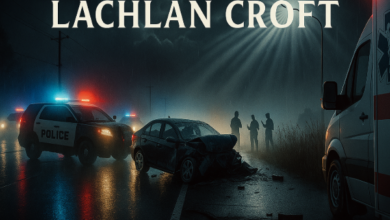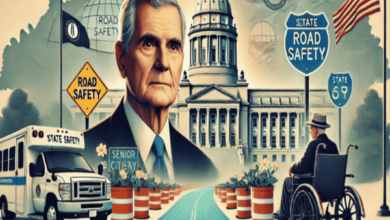UConn Student Dies Parking Garage Fall: Tragedy That Shook the Campus
The Sudden Death of Jackson Carneiro Sparks Grief, Questions, and a Call for Mental Health Awareness at the University of Connecticut

UConn student dies parking garage — on March 7, 2024, Jackson Carneiro, a 20-year-old undergraduate student at the University of Connecticut, tragically fell from the South Parking Garage at the Storrs campus. Despite swift medical attention, he was pronounced dead at Windham Hospital. This heartbreaking event sent shockwaves through the campus community, prompting both an official investigation and increased focus on mental health support services for students. Authorities later ruled the death a suicide, highlighting the urgent need for awareness and preventative action in student mental health care.
Introduction
The University of Connecticut, commonly known as UConn, is a prestigious institution with a thriving student population. However, on March 7, 2024, the campus was shaken by a tragic event that left the community in mourning. Jackson Carneiro, a talented 20-year-old student in the School of Fine Arts, lost his life after falling from a high level of the South Garage. The incident has not only raised questions about safety and mental health but also united the community in grief and reflection. This article explores the circumstances surrounding the tragedy, the response from the university, and the broader implications on student well-being.
Who Was Jackson Carneiro?
Jackson Carneiro was more than just a student. He was an aspiring digital media designer, focusing on 3D animation, and known among his peers for his creativity and dedication to the arts. Originally from Milford, Massachusetts, Jackson had a bright future ahead of him. His professors described him as exceptionally talented, particularly in illustration and animation. He was a quiet but passionate individual who poured his energy into his work.
The Day of the Incident
On the morning of March 7, 2024, students and faculty noticed a heavy police and medical presence around the South Parking Garage on Jim Calhoun Way. At approximately 9:30 a.m., emergency services responded to a report that someone had fallen from the structure. Jackson was found in critical condition and rushed to Windham Hospital. Sadly, despite immediate efforts to save his life, he was pronounced dead shortly after arrival.
Immediate Reactions and University Response
The news of Jackson’s death spread rapidly across campus. UConn issued an official statement acknowledging the incident, expressing condolences, and offering support resources for students, faculty, and staff. The university emphasized the importance of community and reminded students of the available mental health services, including counseling and crisis support.
Candlelight vigils and memorial gatherings were quickly organized by student organizations and the School of Fine Arts. These events became spaces for collective mourning, as friends and classmates shared memories and offered support to one another.
Investigation and Cause of Death
The University of Connecticut Police Department, along with local authorities, launched an investigation to determine the cause and nature of the fall. Within days, the Office of the Chief Medical Examiner ruled Jackson Carneiro’s death a suicide. While no criminal activity was suspected, the ruling intensified the conversation around mental health challenges faced by students, particularly those who may be silently struggling.
The Growing Mental Health Crisis Among College Students
The tragedy at UConn is part of a troubling trend in higher education. Mental health issues among college students have been on the rise, with increasing numbers reporting symptoms of anxiety, depression, and suicidal thoughts. The pressure to succeed academically, socially, and professionally can become overwhelming, especially for students in demanding programs like digital media and the arts.
According to national surveys, nearly 1 in 5 college students have seriously considered suicide. The COVID-19 pandemic only exacerbated these issues, creating a lasting impact on young adults who experienced isolation, disrupted education, and financial stress.
How UConn is Addressing Mental Health
In the wake of Jackson’s death, UConn reaffirmed its commitment to student wellness. The university has begun reviewing its mental health resources and outreach programs. Counseling services were expanded, and faculty were encouraged to be more proactive in identifying students who may need help.
Additionally, discussions have begun about increasing physical safety measures in and around campus parking garages and other high structures. These include barriers, surveillance upgrades, and clearer signage about available support services.
The Role of Community and Peer Support
While institutional support is essential, peer-to-peer networks also play a critical role in promoting mental well-being. Jackson’s passing has sparked numerous student-led initiatives focused on creating safe spaces, encouraging open conversations, and reducing the stigma surrounding mental health.
Clubs and organizations across UConn are working to implement peer mentorship programs, wellness workshops, and mindfulness events. These initiatives are helping to create a more compassionate campus culture, where students look out for one another and know where to turn when in need.
Remembering Jackson Carneiro
Tributes to Jackson continue to pour in from classmates, faculty, and the larger community. His artwork has been displayed in the School of Fine Arts, and a scholarship fund is being discussed in his honor to support other students pursuing digital media and animation.
For those who knew him, Jackson’s legacy is one of creativity, kindness, and quiet brilliance. The conversations sparked by his death may help others find their voice, seek help, and support one another in times of hardship.
What Can Be Done Moving Forward?
Jackson’s death serves as a painful reminder that more must be done to protect the mental health of students. Institutions like UConn must continue to evaluate and evolve their strategies for prevention, early intervention, and crisis response. This includes:
Increased funding for mental health services
Mandatory wellness education
Training for faculty and staff to recognize warning signs
Anonymous online support systems
Collaborations with national mental health organizations
Creating an environment where students feel safe, supported, and seen is essential to preventing future tragedies.
Conclusion
The phrase “UConn student dies parking garage” will forever be associated with a devastating loss — but it can also mark the beginning of a new chapter in mental health advocacy on campus. Jackson Carneiro’s story is not just a tragedy; it is a wake-up call. As the UConn community continues to heal, it also grows stronger, more compassionate, and more determined to support those who may be struggling in silence. Let this moment be a turning point in how we care for one another — not just at UConn, but at universities everywhere.



